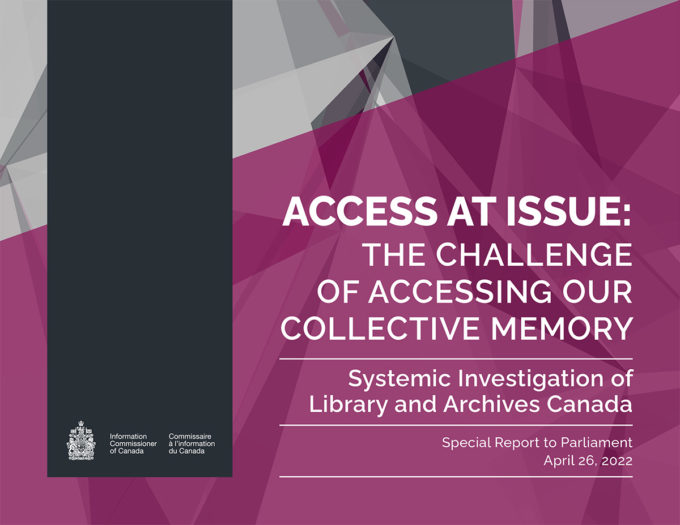 Clients have experienced chronic delays in Library and Archives Canada‘s responses to access to information (ATIP) applications. They are significant, months and even years. The situation became severe enough to warrant an investigation.
Clients have experienced chronic delays in Library and Archives Canada‘s responses to access to information (ATIP) applications. They are significant, months and even years. The situation became severe enough to warrant an investigation.
A report Access at issue: The challenge of accessing our collective memory by The Information Commissioner of Canada, Caroline Maynard, was tabled in Parliament on Tuesday, 26 April 2022.
It concluded that “LAC is not meeting its obligations under the Access to Information Act.”
The report, sent to the Minister of Canadian Heritage in January, includes a copy of his response in an annex. The Information Commissioner then commented, “I remain disappointed by an apparent lack of engagement to make concrete and positive improvements.” The Commissioner calls for “making the proper resourcing of ATIP operations a higher priority.”
More broadly, the report comments that “The challenges that LAC is facing cannot all be addressed through its actions. I call upon the Government to take a broader perspective in its efforts to improve access to information, and to find solutions that address the root causes of these problems.”
Two challenges facing Canada’s access to information system more generally are singled out:
-the manner in which consultations on access requests are conducted between institutions; and
-the lack of a Government-wide framework for the declassification of records.
The Information Commissioner makes the following ten recommendations.
1. Direct LAC ATIP officials to use their delegated authority to respond to all access requests with outstanding consultations forthwith.
2. Direct LAC ATIP officials, for new access requests requiring consultations, to establish a rigorous process to determine the length of time the consultations should take and to respond to those requests before the expiry of the extension sought, with or without the institutions’ input.
3. Process all pending access requests for records classified as Top Secret forthwith, even as implementation and certification of new infrastructure continues.
4. Respond to the backlog of access requests that resulted from LAC suspending ATIP operations during the pandemic.
5. Implement fully functional infrastructure to allow ATIP officials to process Secret and Top Secret records efficiently.
6. Ensure ATIP officials have access to the LAC network and record-processing software at all times, so LAC is always in a position to respond to access requests.
7. Require institutions to review and, whenever possible, declassify or downgrade the classification of records prior to transferring them to LAC.
8. Negotiate adequate funding for LAC’s ATIP office to support new programs introduced by other institutions.
9. Review and adjust the permanent funding for the various units with the ATIP office to reflect their workload.
10. Publish on the LAC website by the end of 2022 the concrete results achieved to implement these recommendations and provide quarterly updates.
In response the LAC website posted a Statement by the Librarian and Archivist of Canada. Lesley Weir accepts that there is a shared responsibility — “With the support of our Minister, we will pursue all available means and channels within the Government of Canada to properly fulfill our mandate and address the issues raised by the Information Commissioner.”
COMMENT
The “apparent lack of engagement to make concrete and positive improvements” by the Minister of Canadian Heritage, The Honourable Pablo Rodriguez, reflects more general government neglect. Recall that the mandate letter to the Minister made no mention of this chronic problem at LAC. While the recommendation of the Commissioner was for LAC to provide quarterly updates on concrete results to implement the recommendations, the Minister commits only to “updates on progress on a semi-annual basis beginning in late 2022.”
For those who have been waiting months and years for a response to routine requests, those not made under the provisions of ATIP and so lower priority for LAC, like Second World War service files, this response from the Minister gives little hope for improved timeliness. Management, starting with the Librarian and Archivist, and the Minister should treat seriously the LAC mandate, which calls for holdings to be available, not just held and not just those ordered under ATIP.


Change — improvement in delivering ATIP services — has to start somewhere and this airing of challenges and problems is a good first step. Let’s hope LAC moves forward on access issues, doing what it is supposed to do, i. e., making available in timely fashion our documentary heritage in all forms.
Several months ago, I wrote my MP an email re: the delays in service at LAC. To my surprise, I received a call from my MP about the issue about 2 months ago, and just yesterday another call from someone in his office, alerting me to the release of the commissioner’s report. We need to collectively continue to remind the government that this is an important issue to us and push for action- your blog does a great job at this.
I believe the legislation must be changed to compel effective engagement of departments to make records older than 25 years available (with due consideration of reasonable exemptions and exclusions).
Items 6 thru 9 – overall additional realistic Heritage funding is required to make all this possible. The notion that the orphaned pandemic backlog can be successfully tackled separate from earlier backlogs looks good on paper.
I believe there is goodwill amongst staff under the leadership of Ms. Weir.
That goodwill requires policy & advocacy support with a strong blend of Heritage funding.
I send Ms. Weir my sincere best wishes.